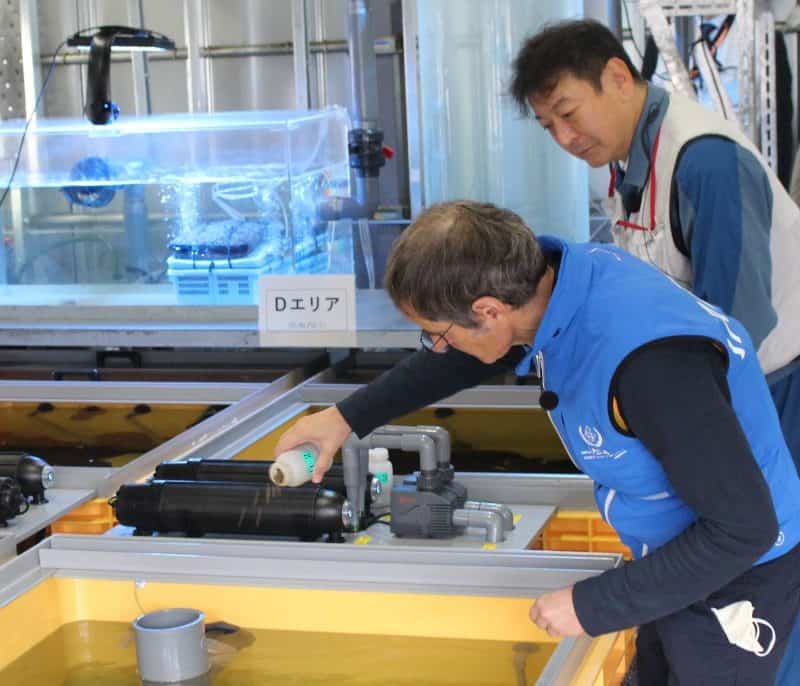South Korea says it believes Japan’s plan to release treated water from the destroyed Fukushima nuclear power plant will meet international standards, days after a United Nations atomic agency review of the controversial proposal found it was safe.
Seoul said its own assessments – based on an inspection of the plant in late May, its own data and the International Atomic Energy Agency’s review – suggested the release of more than 1.3 million tonnes of radioactive water into the Pacific Ocean would be safe if it were carried out as detailed in the proposal.
“We have confirmed the concentration of radioactive material meets standards for ocean discharge … and therefore, the plan meets international standards including those of the IAEA,” Bang Moon-kyu, Minister of the Office for Government Policy Coordination, told in a briefing on Friday.
The proposal to release the water – most of it used to cool the reactors before being treated and stored in huge tanks around the site – has caused concern among many Pacific island nations, which are still dealing with the legacy of nuclear weapons testing.
Much of the concern centres around the potential risks from the radioactive isotope tritium, which is difficult to remove from water.
In its two-year safety review, the IAEA said Japan would dilute the water before discharge to bring the level below regulatory standards, adding that its experts would be stationed at Fukushima for any release, which is expected to take decades.
The plan was “consistent with relevant international safety standards … [and] the controlled, gradual discharges of the treated water to the sea would have a negligible radiological impact on people and the environment,” Director General Rafael Grossi said.
Continued calls for deferment of plan
In a response to the IAEA report, China said it had “failed to fully reflect views from experts” who participated in the review. The state-run tabloid, the Global Times quoted Senlin Liu, a Chinese expert on the agency’s technical working group, saying they were disappointed with the “hasty” report and that the expert input was limited.
On 7 July 2023, China’s customs department announced a ban on the import of food products from 10 Japanese prefectures for safety reasons and said it would step up testing for radioactive substances.
Meanwhile Solomon Islands has joined other Pacific regional governments in calling on Tokyo for a deferral “because of potential transboundary and intergenerational implications.”
“The Pacific has been used as a testing and dumping ground for nuclear weapons and nuclear waste as the Solomon Islands is and remains a nuclear free state and party to the 1985 Rarotonga Treaty,” the Solomon Islands’ Ministry of Foreign Affairs, said in a statement.
Dr Arjun Makhijani, a Pacific Islands Forum expert panelist, has also criticised the IAEA for “ignoring one of its own fundamental principles”, in its report.
The IAEA’s principle means it must prove the benefits outweigh the harm to society and individuals.
“Justification is a fundamental principle for the international standards of radiation protection. It considers that activities giving rise to radiation risks must yield an overall benefit,” the IAEA report said on page 18.
Dr Makhijani said it was “egregious” the IAEA has decided it’s not going to look at this principle because Japan has already done so.
“The IAEA has abandoned its responsibility to review the justification of actions, even though it is part of the fundamental safety principles,” he told RNZ Pacific.
“Principle number four is justification. It is part of the general safety requirements.”
He said the IAEA says it is not looking at justification, because Japan already made its decision to dump.
“In a way, it’s a little bit of sophistry for the IAEA to say it’s not a decider,” he said.
“It’s not, but if the IAEA said, ‘We don’t think this is a good idea’, there’s no way this plan could go forward.
“By saying, basically, that Japan had decided to dump and invited [the IAEA] to look afterwards at how it should be done; and so we will not look at justification, because it was already a done deal.
Dr Makhijani said he has raised his concerns with the IAEA as part of the PIF expert panel.
He said he does not take criticising the IAEA lightly, as it does “important work”.
“The IAEA is refusing to acknowledge its responsibility, and basically abandoning the countries of the Pacific region to whatever mercies the government of Japan might offer them.”
IAEA director-general Rafael Grossi presented the report to Japanese Prime Minister Fumio Kishida in Tokyo last week, saying: “My experts will come back to Fukushima repeatedly, and for as long as the process takes, to take samples at different locations and confirm the water remains safe.”
Grossi said the IAEA has established a permanent on-site office.
“We’ll provide live continuous monitoring throughout the treated water discharge process,” he said.
“Our task is just starting – we’re here for the long haul.”
He has also met with mayors, fishermen associations, and local groups in Fukushima.
“We’re here to listen, explain, and ensure safety – and we’ll stay here true to our commitment before, during, and after the treated water discharge.
“[The IAEA] will maintain its unwavering commitment to safe, peaceful nuclear energy in Japan as it does elsewhere”. TEPCO has yet to confirm a start date.
